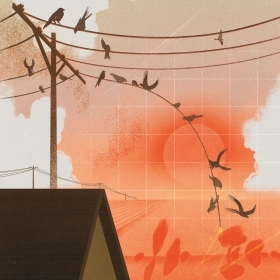I am certain that when the class of ’20 returns for its 50th reunion in 2070, the memory of their final week on campus will be as vivid to them then as it is today. I write this on March 16. The last five days on campus have been simultaneously completely heartwrenching and utterly heartwarming.
The College announced its decision to suspend classes and go to remote teaching last Thursday. Somehow, the seniors managed to paint the campus red overnight—festooning departments in the traditional decorations in their class color—and wore their robes for “the last day of classes.” One senior—not to be left out—made a robe out of trash bags and tape. There were tears and stunned disbelief as the class took in the fact that athletes wouldn’t be able to play their final seasons, that they had to say good-bye to beloved professors and friends instantly, and that commencement might not happen.
Then the flurry began. Several thousand students needed to get to their homes—if they could (a contingent of 165 remained on campus). Rooms had to be packed, storage found, tickets bought, and rides secured. And some had an urgent need for funds for traveling. That’s when Wellesley began showing its true colors.
On Thursday afternoon, the dean of students put out a call for extra boxes, tape, and, most urgently, suitcases. Overnight, the Multifaith Center in the chapel was turned into a depot that looked like a cross between Staples and a luggage store—with hundreds of donations gathered from offices and homes of faculty, staff, and area alums. A local Brownie troop even chipped in. The College provided travel assistance for more than 120 students and started an emergency fund for students to which alumnae contributed. The Students’ Aid Society dispensed grants for rental cars, plane tickets, shipping and storage, internet access at home, and much more, with President Paula Johnson calling the group “an outstanding partner … providing much-needed immediate support.” And totally independent of the College, alumnae used social media and crowdsourcing to match student needs with people around the country who could meet them. Homes were opened for staying or storage. Students were driven to the airport—or farther afield. But most movingly, alums covered thousands of dollars of immediate expenses for students they did not know, sight unseen—with a special focus on first-generation students or those from low-income backgrounds. One alum commented in the Facebook group organizing all of this: “I am not a religious person … but seriously, God bless Wellesley.”
Which brings us to this magazine. Most of the articles and class notes in this issue were written well before the College closed for the semester. So you’ll find in secretaries’ columns references to upcoming travel and mini-reunions and weddings that may not have happened as planned. We have a tiny staff, so we could not update everything. We are as far current as press deadlines allow and will catch up in the summer issue. In the meantime, as many of you still may be at home social distancing or under quarantine when this magazine arrives, we hope it will bring you some Wellesley camaraderie and warmth.
In her memo announcing the cancellation of the Blue’s remaining athletic season last week, Director of Athletics Bethany Ellis spoke of “rally[ing] round our student athletes, holding them tightly in our hearts.” To my eye, there is a lot of heart-holding going on all through the worldwide Wellesley community. We here at the magazine hope you all feel that embrace in this difficult time.








We ask that those who engage in Wellesley magazine's online community act with honesty, integrity, and respect. (Remember the honor code, alums?) We reserve the right to remove comments by impersonators or comments that are not civil and relevant to the subject at hand. By posting here, you are permitting Wellesley magazine to edit and republish your comment in all media. Please remember that all posts are public.